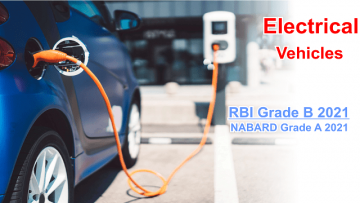
Electric Vehicles
When a vehicle needs electric equipment or motors for its motion is called an Electric Vehicle. It works on the principle of conversion of energy. In these vehicles, Electrical energy is converted into mechanical energy.
There are three basic types of electric vehicles:-
- Battery Electric Vehicle (BEV)-
These vehicles contain motors and batteries and have zero pollution emission. It takes 8 to 9 hours to get charged with an AC charger. They can run up to 500 km. - Hybrid Electric Vehicle (HEV)-
These vehicles are based on Regenerative Braking i.e. Conversion of heat of the brakes into electrical energy. The power is shared by both fuel and electricity. These vehicles contain conventional internal combustion engine propulsion system with an electric propulsion system. - Plug-in Hybrid Electric Vehicle (PHEV)-
The batteries of these vehicles get charged either through external sources or its regenerative braking system. Fueling it will cost less than the vehicle cost as it is really expensive and it can go up to 20 miles without using its combustion engine.
Future of Electric Vehicles in India-
For the green mobility in the nation, The government has been doing its work as population level is reaching sky-high and nation has been stumbling into the global vulnerability index and ranked 5th spot in 2018 from 14th spot in 2017 according to the climate risk index 2020.
The main focus is on converting the public transport more efficient electric vehicles which can control the pollution.
As seen on Google trends, interest of the public for electric cars as compared to two wheelers is tremendously increasing.
Advantages:-
Most important is pollution control as there is no emission issue with electric cars.
Operating and maintaining cost is lower in electric cars as compared to conventional internal combustion engines.
Challenges:-
Charging problem
Battery durability and its actual performance after getting charged.
Lack of Battery manufacturing shop is really a big challenge for Indians to adopt electric vehicles.
As fuel stations are available, the lack of battery charging stations is also an issue.
Its high demand and lower supply due to high customs duty.
Budget 2021 on EV
Every electric automobile company was all ears for the budget 2021 for their sector but this time, FM Nirmala Sitharaman didn’t announce any new reform for EV.
The import duty on the components of battery-powered vehicles has increased between 5% to 15% which will increase the cost of production and ultimately the cost of the vehicles.




